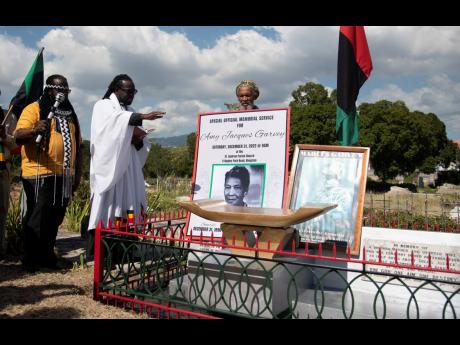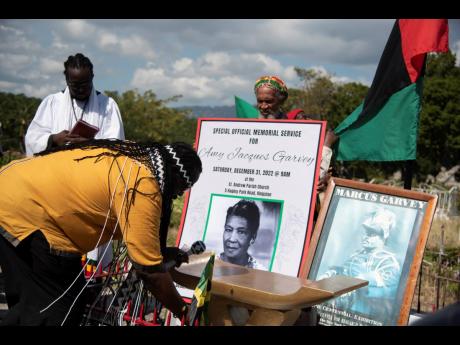Struggle for black freedom continues – Rev Gayle
Jamaicans have been challenged to continue the fight for freedom and peace along the lines articulated by National Hero Marcus Mosiah Garvey and his wife Amy Euphemia Garvey, neé Jacques.
In throwing out this challenge, the Reverend Father Bertram Gayle on Saturday used the homily during the memorial service for Amy Garvey at the St Andrew Parish Church, Half-Way Tree, to question the progress made by black people in Jamaica, after 60 years of political Independence.
“It’s all good to talk about Jesus. It’s all good to talk about Amy. Words are cheap, aren’t they? But it’s even better to talk about how we will live our lives in light of theirs; it’s even better to walk the talk.
“How do we therefore live in a world in which Africa and her children continue to be exploited and brutalised by colonial and neocolonial powers? How do we live in a world in which in our region, our country, black hair, black skin, black culture, black religion, black philosophy, black art, black knowledge, black language and life continue to be seen and treated as less than their white or European counterparts?”
Reverend Gayle questioned the reality of living in a country where despite an estimated 90 per cent of the population being descendants of formerly enslaved people, black men and women still struggle to find themselves and find peace with their African identity.
He then turned the spotlight on parliamentarians. “How do we live in a country in a world in which our black leaders shudder in the face of white economic, political and military might? How do we live in communities, in a country, in a world in which those who wield power in the form of guns, in the form of their connections, in the form of their jobs, in their political offices, etc? How do we live in these spaces where they use the power at their disposal to wreak havoc among us?”
The clergyman then reminded his audience of the price they must be prepared to pay to achieve true freedom. “To bring liberation and freedom requires sacrifice. It requires blood, it requires tears, it requires that we give up comfort and it requires our very lives,” he declared.
The memorial service was timed to coincide with the birthday of Amy Garvey who was born on December 31, 1896 and died on July 25, 1973. She was buried in the St Andrew Parish Church cemetery.
Following the service, a short ceremony was held at the gravesite which featured drumming and a remembrance of the contributions of the Garveys to world history and pan-Africanism and their undying attempts to raise cultural awareness and black pride across the globe.
Amy Garvey’s role in teaching people about her husband after his death in England in 1940 was phenomenal, but it had started long before. Educated at Wolmer’s High School for Girls, after her schooling Jacques did a short working experience with a law firm in Kingston before moving to the United States in 1917. There, she met Marcus Garvey and became involved with the United Negro Improvement Association (UNIA) as Garvey’s companion and personal secretary in 1920.
After Garvey divorced Amy Ashwood, Jacques became his second wife in July 1922 and like her husband, was dedicated to dissemination of the philosophy and principles of race, self-reliance, and nationhood. In 1923, she edited and published Volume One of The Philosophy and Opinions of Marcus Garvey and released Volume Two in 1925. She also edited the UNIA’s newspaper, The Negro World.
Garvey was sent to prison on charges of mail fraud in connection with the Black Star Line and after his release and deportation from the United States, she returned to Jamaica with him and their two children, Marcus Garvey, Junior and Julius Garvey.
After Garvey’s death in 1940, Jacques continued the struggle for black nationalism and African independence. In 1944 she wrote ‘A Memorandum Correlative of Africa, West Indies and the Americas’, which she used to convince UN representatives to adopt an African Freedom Charter. By 1963, she published her own book, Garvey and Garveyism, and later published two collections of essays, Black Power in America and The Impact of Garvey in Africa and Jamaica. Amy Garvey died on July 25, 1973, in Kingston.


